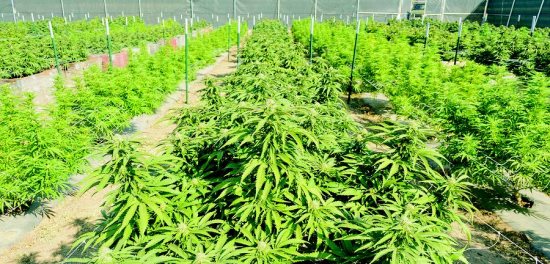 | | | Cannabis growing on a legal medical grow farm in Washington Bigstock images | | | | | | On an early October morning, two deputies from the county sheriff's office knocked on the door of a farm located toward the end of Bollinger Canyon Road. The owners were not happy to see the two officers but knew why they were there; the crop growing on the property was an illegal one: a flowering plant of the Cannabaceae family, more commonly known as marijuana. The owners were given two weeks to remove the crop. But will the year-end legislation that makes the recreational drug's commerce legal permit growing the crop? That remains to be seen.
 Residents claiming to live close to several large cannabis farms located off Bollinger Canyon Road sent the sheriff's office an anonymous letter alerting them of the operation. The letter identified one of the growers, indicating that this activity had been going on for years and claimed it was linked to Mexican cartels dismantled five years ago.
Residents claiming to live close to several large cannabis farms located off Bollinger Canyon Road sent the sheriff's office an anonymous letter alerting them of the operation. The letter identified one of the growers, indicating that this activity had been going on for years and claimed it was linked to Mexican cartels dismantled five years ago.
 Since then, the writers contend, the number of farms has increased, cultivation happens in plain view, and in late fall a large number of pickup trucks running up and down that narrow country road at high speed have been spotted day and night, as well as blacked-out SUVs carrying seasonal workers at harvest time. The whistleblowers also complained of large movement of earth and containers, and the sounds of frequent gunshots that frighten nearby families.
Since then, the writers contend, the number of farms has increased, cultivation happens in plain view, and in late fall a large number of pickup trucks running up and down that narrow country road at high speed have been spotted day and night, as well as blacked-out SUVs carrying seasonal workers at harvest time. The whistleblowers also complained of large movement of earth and containers, and the sounds of frequent gunshots that frighten nearby families.
 Another area resident, who also asked to remain anonymous, confirmed the allegations contained in the letter.
Another area resident, who also asked to remain anonymous, confirmed the allegations contained in the letter.
 The Moraga side of Bollinger Canyon in question is accessible only through the road that branches off St. Mary's Road, at the corner of the local college, but it soon becomes unincorporated land, regulated and policed by the county.
The Moraga side of Bollinger Canyon in question is accessible only through the road that branches off St. Mary's Road, at the corner of the local college, but it soon becomes unincorporated land, regulated and policed by the county.
 Come January, the commerce of marijuana will be legal in California, but does that mean that these farms will be able to operate legally? It may not be that simple.
Come January, the commerce of marijuana will be legal in California, but does that mean that these farms will be able to operate legally? It may not be that simple.
 Contra Costa County Supervisor Candace Andersen explains that the county still has to regulate what will be and will not be permitted within the county limits and is in no hurry to do so. She explains that many aspects of the cultivation will have to be regulated, as is done for any farming activity.
Contra Costa County Supervisor Candace Andersen explains that the county still has to regulate what will be and will not be permitted within the county limits and is in no hurry to do so. She explains that many aspects of the cultivation will have to be regulated, as is done for any farming activity.
 Andersen adds that it is a good thing, since at this time no control is undertaken of potential environmental hazards impacting local streams and creeks with runoffs of pesticides and fertilizers in what ultimately becomes our drinking water.
Andersen adds that it is a good thing, since at this time no control is undertaken of potential environmental hazards impacting local streams and creeks with runoffs of pesticides and fertilizers in what ultimately becomes our drinking water.
 The anonymous letter writers also alleged that pesticides and fertilizers are used unchecked in the Bollinger farms, polluting Bollinger Creek that is part of the large Walnut Creek watershed.
The anonymous letter writers also alleged that pesticides and fertilizers are used unchecked in the Bollinger farms, polluting Bollinger Creek that is part of the large Walnut Creek watershed.
 Andersen also noted that the county is likely to be sensitive to what local jurisdictions authorize as far as cultivation, and will regulate specific areas with similar restrictions as those imposed in adjacent communities. Moraga has adopted policies that do not allow for open field and large scale cultivation of cannabis.
Andersen also noted that the county is likely to be sensitive to what local jurisdictions authorize as far as cultivation, and will regulate specific areas with similar restrictions as those imposed in adjacent communities. Moraga has adopted policies that do not allow for open field and large scale cultivation of cannabis.
 The Moraga police department confirmed that its jurisdiction does not extend to unincorporated Contra Costa County. A few years ago, however, Moraga police officers took action alongside East Bay Regional Park District rangers when shooting presumably attributed to outdoor cannabis growing happened in the wilderness area off Rancho Laguna Park.
The Moraga police department confirmed that its jurisdiction does not extend to unincorporated Contra Costa County. A few years ago, however, Moraga police officers took action alongside East Bay Regional Park District rangers when shooting presumably attributed to outdoor cannabis growing happened in the wilderness area off Rancho Laguna Park.


|
